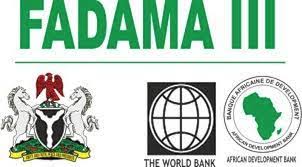The World Bank has provided an additional funding support totalling N303 billion to Nigerian farmers participating in the Fadama III AF Project for the cultivation of four advantage crops supported by the project..
The project’s Task Team Leader, Dr. Adetunji Oredipe, listed the project crops as rice, cassava, sorghum and tomato.
The team leader gave these hints this during a special award ceremony organised by the National Fadama Coordination Office in Abuja to recognise employees and other stakeholders that contributed towards the successful implementation of the project in Nigeria.
Oredipe disclosed that the Fadama III AF had contributed to the nation’s agricultural sector growth based on its contributions to the Gross Domestic Product (GDP), food security, youth and women employment and rural development.
Specifically, he cited the graduate youth unemployment scheme of the project in which agric entrepreneurship trainings will be provided to scores of Nigerian youths and they will be supported with financial grant to set up small agric business in the area of the choices.
The team leader explained that the achievements were recorded as a result of commitments by all stakeholders to the success of the project, including the Minister of Agriculture and Rural Development, Chief Audu Ogbeh
Oredipe charged the management of the National Fadama Coordination Office to ensure that, the remaining indicators of the objectives of the project were achieved before the end of the project in 2019.
In his remarks, the National Project Coordinator of the Fadama III Additional Financing Project, Mr. Adetayo Adewumi, disclosed that the project had added a total of 3.69 million metric tons of rice with 1,497,366 metric tons, cassava 841, 054, tomato 1,497, 366 and sorghum 184,978 metric tons to the nation’s food stock.
This is even as he explained that the North East food security and livelihood Emergency support project had also helped in rehabilitating displaced persons as a result of the activities of the insurgency in the North East.
Adewumi also said that based on the implementation of the project in the troubled North-East zone, the nominal income of internally displaced persons had increased by 37 percent as a result of increased yield, good agronomic practices and capacity building.
The Coordinator hinted further that this year about 12,000 households had been targeted to benefit in the North East, adding that out of the 22, 551 internally displaced persons that benefitted from the scheme in the past, 53 percent are women.
In addition, he explained that the project had engaged many youth and women as Fadama Vanguard, who were engaged in tree planting, soil conservation, sanitation works, change cleaning and other activities within the six states of the North Eastern zone.
According to him, the scheme is intended to provide immediate employment to the returnees and internally displaced persons with a view to bridging the income gap between the time of return and such a time that returning farmers can earn income from their usual livelihood.
He listed other interventions under the project to include, crops livelihood such as fertilizer, insecticides, maize, sorghum and rice seeds respectively.
Adewumi also disclosed that the project had facilitated the construction of a total of 222.32 ICM roads in Lagos, Anambra, Enugu, Kogi and Kano states with 26 irrigation canals while 760 hectares had been cleared also to support production, transportation and marketing of rice, cassava, sorghum and tomato respectively.






